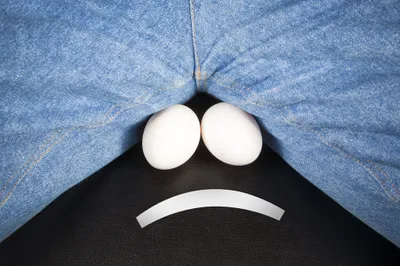A vasectomy is an extremely common surgical procedure performed to provide male contraception. The procedure blocks sperm from being released during an ejaculation, ultimately preventing a man from fertilizing a woman’s eggs. It’s a highly effective form of contraception and one that many people and couples choose to make if they don’t want children or don’t want to have any more children. But like many other surgeries and health-related choices, there’s a fair amount of confusion, misconception, and general lack of understanding about vasectomies. It’s bound to happen, considering it’s a medical procedure and there’s always anxiety surrounding them.
So get in the know by learning the myths and realities about vasectomy. Arming yourself with the right information will help you make an informed decision…
1. Reality: A Highly Effective Option
For women, birth control like the pill, patch, and IUD are available and generally quite effective. But more men are taking the steps to become sterile through a vasectomy, which is a highly effective option. There’s some debate about how effective a vasectomy is in terms of percentages. Some doctors say that when performed correctly, a vasectomy is 100-percent effective after the predetermined time frame your doctor recommends, while other doctors argue that the procedure is never 100-percent effective. Regardless, it’s highly effective, with cases of pregnancy in much less than 1-percent of cases.
An important fact to note is that the effectiveness isn’t immediate and a lot of men and women are surprised to find out they can get pregnant within a certain time frame after the procedure. Depending on the doctor, it can take roughly 2 to 3 months until all of the leftover sperm are gone from the urethra (that’s approximately 15 ejaculations). The best bet is to do follow ups to measure sperm count and make sure it’s down to 0 before having unprotected sex.
2. Myth: It’s Permanent
Before you freak out and worry you’re going to impregnate someone (or as a woman, get impregnated yourself), yes, vasectomies are meant to be permanent and it’s very unlikely the procedure will end up failing. The goal of a vasectomy is permanency, but this myth busting addresses the fact that they can often be reversed and as long as neither the man or woman has any fertility issues, there’s a fairly good chance they’ll be able to have children. It’s a rare medical procedure that allows such decision to be made, but it can be done in many cases.
Obviously, with any surgery like this, there are many factors that contribute to the ability to have a vasectomy reversed. But many people end up in a situation where they want it reversed. Whether they divorce and meet someone new, or if the decision to have children (or more children) changes, reversing a vasectomy has happened successfully. The man never stops producing sperm, so there’s a chance to have children after a reversal.
3. Reality: It’s Safe
Performing a vasectomy is not only a quick procedure—around half an hour—but it’s also safe. Yet many men and women worry about the surgery and the healing process when it’s standard to only require 1 or 2 days to recover from the procedure. The most common symptoms after a vasectomy include swelling and soreness, but it’s rare for either to last. Usually over the counter medication like ibuprofen and cold compresses take away most pain or discomfort.
There are actually two ways to perform a vasectomy, including a no-scalpel vasectomy. That said, both vasectomy procedures can be preformed safely and effectively, and carry very little risk. Even in rare cases, where patients develop serious pain due to pressure that builds from not relieving sperm, can be eased by reversing the procedure if necessary. Overall, risk is low and vasectomies are considered a safe form of male contraception.
4. Myth: It Causes Impotence
A common myth about vasectomies is that it causes impotence, the inability to get an erection and keep one in order to have intercourse or perform other sexual acts. However, a vasectomy does not cause impotence. The procedure seals the tube that carries sperm (the urethra), preventing sperm from being released during ejaculation. This does not, in any way, lead to impotence because a vasectomy doesn’t affect or limit male hormone production. Also, the release or lack of release of sperm is not related to impotence.
Some people worry about a vasectomy causing impotence because they believe that preventing sperm from being released during ejaculation lowers the man’s ability to maintain an erection. However, sperm makes up very little of the fluid released during ejaculation compared to semen, so there isn’t much difference after a vasectomy is performed. In fact, it’s so minimal that you wouldn’t notice a visual difference at all. At the end of the day, the sperm that’s still produced, even after a vasectomy, is usually successfully absorbed into the body, causing no difference or repercussions.
5. Reality: No Increased Risk of Disease
Aside from sexually transmitted infections (STIs) that you should always be aware of and protect against, there’s no increased risk of disease from having a vasectomy. And this procedure doesn’t put you at risk of developing cancer, specifically prostate and testicular cancer, as some believe. Many surgeries and medical procedures are mistakenly believed to cause diseases like cancer, but it’s simply not the case. There’s no medical explanation for increased risk of cancer with a vasectomy.
There’s always a chance of infection when incisions and stitching are performed with any surgical procedure, although this is rare and usually treated by a doctor very easily. Aside from the rare infection, bruising and swelling is what’s most common with vasectomy, though these symptoms don’t typically persist past a few days. There is a small amount of men who suffer from pain because of the sperm not being released and not successfully reabsorbed into the body, but there are options to stop this from happening.
6. Myth: You Stop Producing Sperm
When a man has a vasectomy, it’s a common misconception to think that he stops producing sperm. However, after a vasectomy, it’s the sperm’s ability to be released that’s blocked off not his ability to produce sperm. This misconception alone can cause men to avoid the procedure. The decision to have a vasectomy or not shouldn’t be based on the common myth that sperm production stops.
It doesn’t matter what type of vasectomy is performed, the conventional or no-scalpel option, the end result is always that the sperm is prevented from traveling through the urethra for release during ejaculation. Nothing else is done to change the way a man produces hormones, sperm, or any other function. It seems simple and it usually is, so give it consideration if your fear of vasectomy has been rebuked after addressing this myth and the others in this article.
7. Reality: It’s Not Very Painful
It’s not uncommon for men to have a moment of queasiness or uncertainty around the idea of any procedure being performed on their genitals, let alone something that involves cutting and stitching up tubes accessed through the scrotum. However, vasectomies really aren’t very painful. Nothing is felt during the procedure and any discomfort is short-lived for the vast majority of male patients. In the case of a very effective form of contraception, the benefits far outweigh the low-level of pain.
A vasectomy is a common procedure that usually only involves a local anesthetic and can be done at health clinics, doctor’s offices, and other medical centers. It doesn’t require a hospital stay and research has shown it’s rare for a vasectomy to cause more than a small amount of pain. As mentioned previously, over the counter pain relief through ibuprofen and a cold compress to relieve any swelling is all that most men require. So while the idea of a vasectomy might cause distress, the actual procedure and healing process isn’t very painful.
8. Myth: Decrease in Pleasure
Along with the myth that a vasectomy will cause impotence, there’s also the misconception that it will decrease pleasure during sex or prevent a man from reaching climax. Since a vasectomy doesn’t change a man’s hormones or ability to ejaculate, there isn’t any reason or proof that it decreases the pleasure felt when engaging in sexual acts. Everything will look and feel the same, so there’s nothing to worry about related to pleasure.
On top of the fact that a vasectomy doesn’t impact or detract from the pleasure men experience, many men who have been interviewed and doctors who have spoken to their patients say that a lot of men feel huge relief after the procedure. This can contribute to their sexual experiences, potentially improving them because of the lack of pressure or worry about unwanted and unplanned pregnancies. This might be especially true for men and their partners who don’t want more children, but don’t want to worry about other forms of contraception.











